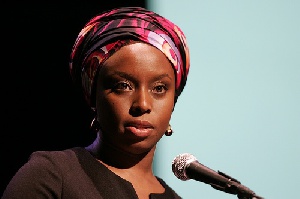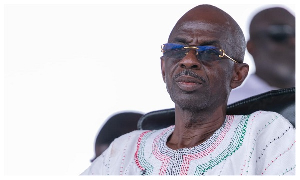One of the world’s leading feminists is not the obvious choice to be the face of a make-up brand, but Boots has just made Chimamanda Ngozi Adichie the face of No7.
The Nigerian novelist was well known in literary circles but gained a far wider audience after Beyonce used an extract of her Ted Talk called We Should all be Feminists in her 2014 track Flawless.
Now her words are being used again in a Boots advert released this week: “For a while I stopped wearing make-up and hid my high heels. And I became a false version of myself. But then I woke up and I saw in full colour, full confidence again.”
As a feminist, she is aware that she has to explain her relationship with make-up.
In her Ted Talk she said that the word feminist was “so heavy with baggage, negative baggage. You hate men, you hate bras, and you hate African culture.”
Instead, she said, she wanted to be identified as a “happy African feminist who does not hate men and who likes lip gloss and who wears high heels for herself but not for men”.
Chimamanda Ngozi Adichie
While this highly specific definition of a feminist was tongue-in-cheek, she still felt the need to defend wearing make-up earlier this month.
In a 9,000-word Facebook post she wrote a guide to show how to bring up a feminist daughter.
“If she likes make-up let her wear it; if she likes fashion let her dress up. But if she doesn’t like either let her be.”
She advised that raising a feminist didn’t mean forcing her to reject femininity: “Feminism and femininity are not mutually exclusive. It is misogynistic to suggest that they are.
“Sadly, women have learnt to be ashamed and apologetic about pursuits that are seen as traditionally female, such as fashion and make-up.”
This comes from personal experience.
In her Ted Talk, she revealed that when she was getting ready to teach her first writing class she felt a pressure to avoid looking feminine: “I really wanted to wear my shiny lip gloss and my girly skirt but I decided not to.
“Instead I wore a very serious, very manly, and very ugly suit. Because the sad truth is that when it comes to appearance, we start off with men as the standard, as the norm.
“If a man is getting ready for a business meeting, he doesn’t worry about looking too masculine, and therefore not being taken seriously.
“If a woman is getting ready for a business meeting she has to worry about looking too feminine, and what it says, and whether or not it will be taken seriously.”
After a while she scrapped the suit, and said she was a better teacher once she was wearing what she felt comfortable in.
Who is Chimamanda Ngozi Adichie?
• Grew up on a university campus in Nsukka, south-eastern Nigeria, where her father was a professor
• Awarded the Commonwealth Writer’s Prize, the Orange Prize and a $500,000 (£320,000) MacArthur Foundation “genius grant”.
• Best known for her novels Purple Hibiscus, Half of a Yellow Sun and Americanah
• Half of a Yellow Sun, about the Biafran war, was made into a film starring Chiwetel Ejiofor
• Her Ted Talk We Should All Be Feminists was featured in Beyonce’s track Flawless
It is Ms Adichie’s own voice from this Ted Talk that is included in the Beyonce track Flawless: “We teach girls to shrink themselves. To make themselves smaller. We say to girls: ‘You can have ambition, but not too much. You should aim to be successful but not too successful because otherwise you will threaten the man.'”
Her speech continues, without interruption from Beyonce, arguing that girls, unlike boys, are taught to see marriage as success, something that should be prioritised above other life choices: “Because I am female I am expected to aspire to marriage.”
Beyonce even leaves in an extract of Ms Adichie reading out a dictionary definition of a feminist: “Feminist. A person who believes in the social, political and economic equality of the sexes.”
It had impact.
“If you get to put in a Beyonce song, that is like being put in the Super Bowl for free in terms of impact,” said founding women’s editor at the Telegraph Emma Barnett.
Models walked down the catwalk of Dior’s autumn 2016 show wearing T-shirts with the slogan “We Should All Be Feminists”.
After Ms Adichie got the No7 gig CNN asked if she was now the most influential woman in Africa.
She is taken seriously by feminist thinkers as well.
Harvard lecturer Phyllis Thompson told the BBC that Ms Adichie’s Ted Talk was the first assignment she gave to her gender studies students.
It’s not that she is saying anything new, but the way she says it that is accessible, which makes her “extraordinarily influential”, explains Ms Thompson.
In terms of feminist thought on make-up, Ms Thompson points out that “extreme voices” like Sheila Jeffreys say make-up is outright abuse of women, while Naomi Wolf has noted the great amount of both time and money that it requires of women.
But she says Ms Adichie’s relationship to make-up is very much in line with the “third wave feminism” of the 1990s and current post-feminism, both of which encourage women to do what makes them feel confident, and to take pleasure in their own presentation.
One thing feminism of the 1990s attracted criticism for was attempts by Western women to speak for women worldwide, Ms Thompson says.
She argues that this is why it is so encouraging that Ms Adichie is from Nigeria: “Speaking for her culture, not being spoken for, in terms so clear that she has a gigantic audience is helping correct a balance.”
‘Nigeria is a patriarchy’
At the moment Ms Adichie has a house in the US and in the Nigerian city of Lagos, flying between her two homes.
For Abuja-based feminist Florence Warmate, who started the popular hashtag#BeingFemaleinNigeria last year that matters.
“In Nigeria, there is still a patriarchy,” she told the BBC, pointing to the Nigerian president’srecent comment that his wife belongs in the kitchen as proof.
She said that Ms Adichie’s experience of life in America, where she went to study at the age of 19, has allowed her to “take herself out of the [Nigerian] situation and properly analyse it”.
Ms Adichie herself said on BBC Woman’s Hour this week that her move to the US had an impact, specifically on her appearance.
“I was raised to care about my appearance but when I went to the US I internalised the idea that if a woman wants to be taken seriously, she can’t seem to care too much about her appearance.”
She went back to wearing make-up when she came to a realisation: “I don’t really care very much about what anyone else thinks.”
This lesson – to stop caring what others think – is what she says is the most important thing to pass on to daughters.
“We teach girls to move themselves into shapes to make themselves likable, to think about what other people think about them,” she told Woman’s Hour.
“It’s so important to teach a child, particularly a girl, that your job is not to be likeable, your job is to be your fullest self.”
Opinions of Saturday, 22 October 2016
Columnist: BBC.com
Face of feminism: Is it problematic for a feminist to sell make-up?
Entertainment














